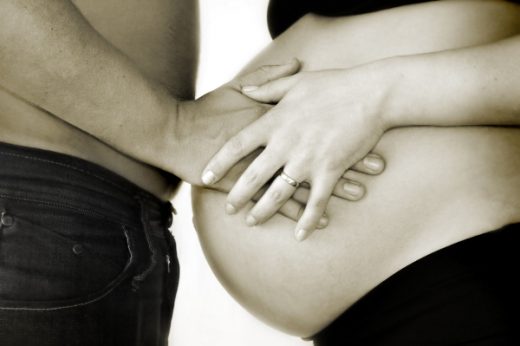 When I asked my wife, when she was pregnant, what she thought about natural childbirth, she told me she was uninterested. She planned on using an epidural to deal with the inevitable, and horrible, pain. She worked as a physician in a hospital at that time, so I know she welcomed whatever other procedures would alleviate pain, make the birth go faster and, most importantly, ensure a healthy baby and mommy. I didn’t press the issue, figuring it’s her body, and her choice. That was that… Or not.
When I asked my wife, when she was pregnant, what she thought about natural childbirth, she told me she was uninterested. She planned on using an epidural to deal with the inevitable, and horrible, pain. She worked as a physician in a hospital at that time, so I know she welcomed whatever other procedures would alleviate pain, make the birth go faster and, most importantly, ensure a healthy baby and mommy. I didn’t press the issue, figuring it’s her body, and her choice. That was that… Or not.
As it turned out, my wife birthed with no medical intervention and no drugs, in the comfort of our own home. We switched from a hospital birth to homebirth in her last trimester. Both she and our daughter were completely healthy. My wife birthed without pain. She says the birth was intense–the most intense experience, perhaps, of her life. But it was not painful.
She opted for a natural birth because we learned about lots of the benefits:
- Avoid the cascade of interventions resulting from using an epidural, such as pitocin, vacuum, forceps and C-section.
- Not being hooked up to monitors meant my wife could move around and be in more comfortable and optimal birth positions.
- Avoids tearing that often results from timed/forced pushing. That kind of pushing is used when an epidural makes it hard for a woman to feel her contractions. In natural birth, your body definitely knows when to push.
- Optimal levels of oxytocin. Oxytocin is a powerful hormone that stimulates the uterus to start the birth process. Oxytocin, also known as the “love hormone,” is integral to breastfeeding and bonding between mother and baby.
- Natural birth is highly empowering, and seems to tap into an instinctual and primordial rite of passage for mother and baby.
So, how did my wife go from wanting a hospital birth, with epidural, to a pain-free homebirth? There are a lot of factors, and a lot of ways a woman can deal with fears and pain around and during childbirth. Below I have a list with a lot of the physical things you can do to reduce pain. But in looking back on our experience, I think the two biggest contributors to my wife’s positive birth were:
1. Strong support and community: Having close friends who were home birthing gave us a real foundation of support. Having that support was so helpful. We were able to explore things together. It was great to be able to bounce ideas and feelings off of each other–to share facts or tips we each found. I think a positive support system is integral, but unfortunately is missing in many cases. The great thing is that the support system has continued into our family journeys. Having friends who are similarly minded about attachment parenting, breastfeeding, cloth diapers, nutrition, education–even if we don’t share the exact goals–is invaluable. That support provided a lot of reassurance for my wife, and it’s my belief that support and reassurance helped to alleviate stress and fears she had about childbirth.
2. Guided hypnosis and affirmations: I never imagined that these two things would play such a strong role in the birth of our daughter. But, in fact, they created a strong positive, inner support system. My wife listened to her Birth Class Hypnosis CDs daily (and I often did too). These really were like a deep relaxation escape in her day. Most importantly, they helped her re-create her vision of birth from what she saw as the most painful experience of her life, to an experience of joy. Maybe that sounds like some new agey voodoo or something. I was a doubter in lots of ways. But, for my wife, it really worked. Those guided hypnosis CDs, along with repeated affirmations, made my wife realize that she could birth without fear, without drugs, and as it turned out, without pain.
The idea of using hypnosis, imagery and affirmations to reach positive outcomes, has actually changed our lives. Like the strong support and community from exterior sources, this strong inner support is often missing for people.
Other Pain-Free Birth Tips
There are definitely other things my wife did that contributed to her positive and pain-free birth. Of course, neither of us would say, “If you do all this stuff you will have no pain.” These things just worked really well for her, and for many other women. At the least, I’m sure they are helpful in managing pain, so we want to pass them along.
During Pregnancy:
- Kegal Exercises – This basically involves contracting and relaxing the pelvic muscles. Kegals strengthen those muscles, making laboring and pushing easier, and reducing the chances of tears.
- Prenatal Yoga
- Nutrition:
- Lots of water.
- Not much processed food; not much salt or sugar; lots of protein; lots of greens.
- Taking a natural prenatal supplement. She used NewChapter Organics Perfect Prenatal.
- Red Raspberry Leaves (brewed as a tea) – Not only is this a great, natural source of vitamins A, B, C, E, calcium and iron, it also tones the muscles of the uterus. Strengthening those muscles will reduce pain during labor and after birth. It actually helps the uterus function without tension, making birth easier, and often faster.
- Nettle Leaves (brewed as a tea) – My wife took this to ease swelling and cramping in her legs and feet, but it is also known to reduce pain during and after birth. It’s also a great source of vitamins A, C, D and K.
During Birth:
- Good birth positions: I think a homebirth, or birthing center birth, provides the best venue for optimal birthing positions. They both allow for a lot of freedom of movement, because you’re not hooked up to monitors or other medical machinery. My wife found standing, and more upright positions, the most comfortable. Gravity is your friend :)
- Birth tub, bath or shower (water, in general).
- Hydration from water, tea, and a natural Gatorade-type drink called Recharge (to replenish electrolytes). Or try this:
- ⅓ cup honey or maple syrup
- ⅓ cup lemon juice
- ¼ tablespoon calcium tablets crushed
- ¼ tablespoon baking soda
- ½ teaspoon salt
- 1 quart filtered water
- Resting in between contractions. This will keep your uterine muscles from getting exhausted. Exhausted muscles are often pained muscles.
- Keeping your mouth/jaw relaxed and loose. There is a strong connection between the jaw and the pelvis. Keeping the jaw loose will keep your pelvic muscles loose. When your muscles are loose, you’re not fighting against your body’s natural ability to birth.
- Not being constantly monitored: Our midwives really let my wife labor on her own. they would check on her, and make sure things were okay. But in general, they stayed out of her way. So, she wasn’t getting all stressed out about beeping from monitors, or a doctor or nurse telling her that things aren’t moving along quickly enough.
Perhaps it’s odd that a man is trying to convey the importance of choosing the best birth setting for you, or that a man is talking about pain relieve in childbirth. What do I really know about it? I certainly have no idea what it feels like to be pregnant, to birth a baby, to nurse a baby or to be a mother. But I watched my wife experience a huge connection, an trans-formative empowerment and an amazing joy. And I am positive, with every fiber in my body and soul, that that birth experience has made her a better and stronger mother. I think that the numbers of women that dilute that experience unnecessarily is very sad, and I think it is a beginning point for a lot of societal problems we currently face (but that is another article in and of itself). So, it is my hope that we shift the trend of medicalized birth to one that is more in tune with the way this all too important rite of passage was meant to be. I think more women will consider that if they know that birth is not something to be feared, but something to look forward to.
Jeremy Dyen is a musician, husband and father living in Philadelphia. Currently, he and his wife have a Free Childbirth Tips Video Series, and a Free 10 Minute Guided Imagery Download you can access at Fear Free Birth




Thank you for this guest post, how timely for me at 2 months pregnant and planning a water birth at a birth center. :)
Congratulations to you and your wife! Natural childbirth is truly amazing. Thanks for sharing your experience so others can see that it really is possible and so rewarding.
I am five months pregnant and am planning on a natural labor but have been told because of an anterior placenta that I will most likely experience back labor… every doc I have talked to (and mothers too) all say that with back labor you can’t do natural… of, course I don’t believe them, but I would like to find some natural birthing mamas who had back labor to get some tips… did your wife have an anterior placenta and/or back labor by chance?
Thank you for writing this story here! I sure hope that more people give birth at home, it is so good! I live in Europe (netherlands) and giving birth at home is normal overhere but more and more woman choose for painkillers and the hospital. Not me, I gave birth four times at home and it al went fine. The first birth was a bit heavy (I was standing up, a african way of pushing, and had a lot of muscle pain in my shoulders the day after), the second birth was difficult and my son had his cord two times arround his neck, but the midwife got it of easy (i did not even noticed!), the thirt birth almost happend in the shower (again a big child, nearly 10 pounds with the cord arround his neck) and the fourth birth went so easy (no stitches this time, jippy! But again a huge baby).
I was 27, 30, 33 and 39 years old and it was the best experience ever. Although it sure was painful! I somehow went into a second dimention and survived. After each birth I felt like when I could survive this, I could never ever die…such a lot of strange pain. If I should ever get pregnant again, I sure would take yoga and try to relax more.
greetings from mama lieveheersbeestje.
I think your (wife’s) experience is fantastic and definitely the optimal way to birth a baby if at all possible but regarding your contention, “that that birth experience has made her a better and stronger mother” I would have to strongly disagree. I have 4 children 3 months to 7 years who were all delivered by c-section (not my choice, but medically necessary) and in no way does that make me a lesser mother than anyone that delivers vaginally. I was cheering your wife on until I realized that you just insulted me and anyone else whose birth experience does not live up to your own.
You may not realize it but many women who deliver via c-section are left with a great deal of regret over the birth – even if they had little say in the matter.
I am a huge advocate for reducing c-sections, but sometimes they are simply not avoidable – especially in the medical environment we have now (which desperately needs changing). Your statement, whether it was intended to or not, feeds into the idea that women who deliver surgically “failed” somehow – failed themselves, failed their babies, and failed as mothers.
I am going to have to defend the author and disagree with you. So many of the experiences we have shape us and strengthen us so yes I do believe that the way one gives birth can in fact strengthen them and empower them, and perhaps even make them better mothers. To say that birth experience cannot do these things in my mind is false. The author’s wife knows what she experienced, what she felt, and what she learned. Perhaps you learned some of same things in your own birth process, maybe not. It does not matter though. To share what empowered you and made you a stronger, better woman is not shameful or intended do downplay the personal journeys and experiences of others as you seem to insinuate.
Oh and by better mother I don’t mean better than other mothers. I mean better than what you would have/could have been yourself… and I think that is what the author meant too.
I think it is wonderful that you, as the support partner, are so involved in the birth. I don’t feel your advice is unfounded because you did not experience it yourself, as you obviously were very connected with your wife and her experiences during labor and birth. I do think how you birth has an effect on how a woman becomes a mother. My first was a c-section, even though I tried so hard for a natural birth. After that “failing” it was hard to believe that I was the be all end all for this child, who could trust my instincts. I eventually learned it, but after my second child was born at home, it was almost instant. Thanks for sharing your list, I’ll be jumping over to your site to explore for my 3rd baby!